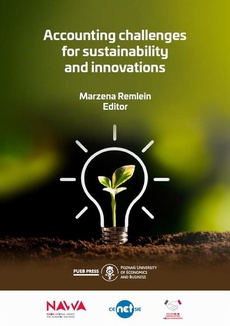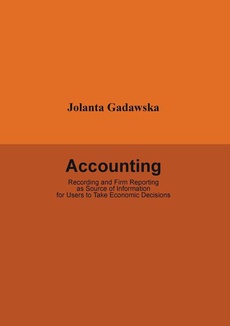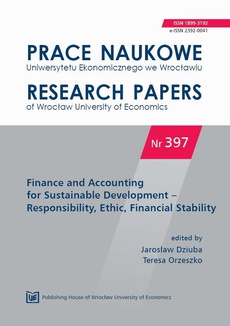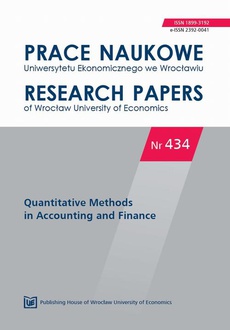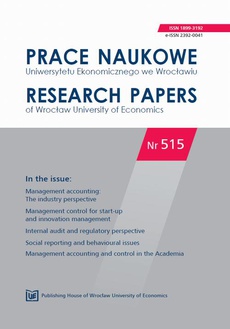POLECAMY
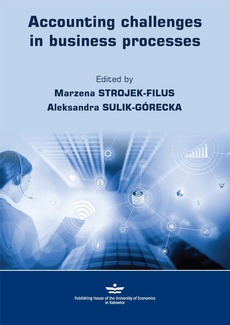
-17%
Accounting challenges in business processes
Format:
pdf, ibuk
The study is divided into three chapters corresponding to the identified problem areas. The first chapter is devoted to selected issues of the broadly understood valuation in accounting. The second chapter discusses the problems of reporting financial and non-financial data by economic entities and capital groups. The focus is on reporting aspects such as scope, degree of detail, and methods. The third chapter is devoted to selected problems related to the functioning of the accounting system in specific entities, including non-commercial ones. This publication is addressed to a wide range of people involved in the process of generating financial and non-financial information, as well as people who directly or indirectly use such information, both on theoretical and practical basis.
| Rok wydania | 2019 |
|---|---|
| Liczba stron | 143 |
| Kategoria | Finanse i bankowość |
| Wydawca | Wydawnictwo Uniwersytetu Ekonomicznego w Katowicach |
| ISBN-13 | 978-83-7875-543-2 |
| Numer wydania | 1 |
| Język publikacji | angielski |
| Informacja o sprzedawcy | ePWN sp. z o.o. |
Ciekawe propozycje
Spis treści
| INTRODUCTION | 9 |
| 1. MEASUREMENT IN ACCOUNTING IN TERMS OF BUSINESS PROCESSES | 11 |
| 1.1. Revenue in theoretical concepts of accounting (Lucyna Poniatowska) | 11 |
| 1.1.1. Concepts of performance measurement in accounting | 11 |
| 1.1.2. Revenue in theoretical concepts of accounting and accounting regulations | 15 |
| 1.1.3. Principles of revenue measurement and recognition | 18 |
| 1.1.4. Conclusion | 21 |
| 1.2. Accrual and cash measurement in the accounting of public finance sector entities (Iwona Franczak) | 22 |
| 1.2.1. Organizational and legal forms of public finance sector entities in Poland | 22 |
| 1.2.2. Measurement under cash and accruals convention in accounting for the public finance sector in Poland | 25 |
| 1.2.3. Measurement principles in accounting and International Public Sector Accounting Standards | 27 |
| 1.2.4. Conclusion | 29 |
| 1.3. Principles governing accounting records for European Union Funds (Ewelina Papaj-Wlisłocka) | 30 |
| 1.3.1. The role of EU grants in Poland | 30 |
| 1.3.2. Tasks financed with EU funds – formal and accounting requirements | 33 |
| 1.3.3. Accounting policy and company’s chart of accounts | 33 |
| 1.3.4. Accounting data archiving | 35 |
| 1.3.5. Financing tasks from EU funds in the economic practice of Silesian associations | 36 |
| 1.3.6. Conclusion | 40 |
| 2. DIVERSIFICATION OF DISCLOSURES IN THE FINANCIAL AND NON-FINANCIAL STATEMENT | 41 |
| 2.1. Presentation of information on capital relations in the financial report under Polish legal regulations (Marzena Strojek-Filus) | 41 |
| 2.1.1. Capital relations pursuant to the Accounting Act | 41 |
| 2.1.2. The obligation to consolidate financial statements and the control relationship | 45 |
| 2.1.3. Information disclosures on capital relations in a separate financial statement | 51 |
| 2.1.4. Conclusion | 53 |
| 2.2. Disclosure of information on intangible assets in terms of materiality principle (Iwona Kumor) | 54 |
| 2.2.1. Materiality principle and disclosures of intangible assets | 55 |
| 2.2.2. Recognition of intangible assets in the financial statement | 56 |
| 2.2.3. Disclosure of information on intangible assets in the financial statement | 58 |
| 2.2.4. Assessment of the scope and materiality of information disclosures on intangible assets | 60 |
| 2.2.5. Conclusion | 62 |
| 2.3. Reporting non-financial information from ESG areas (Katarzyna Tkocz-Wolny) | 63 |
| 2.3.1. Non-financial information legal regulations | 63 |
| 2.3.2. Entities under the non-financial reporting obligation | 64 |
| 2.3.3. The scope of mandatory non-financial reporting | 66 |
| 2.3.4. Conclusion | 71 |
| 3. SELECTED ISSUES OF MODERN ACCOUNTING | 73 |
| 3.1. The importance of investment fund reporting (Aleksandra Sulik-Górecka) | 73 |
| 3.1.1. The role of investment funds in modern business | 73 |
| 3.1.2. Information needs of financial statement users | 76 |
| 3.1.3. Reporting obligations of investment funds in Poland | 77 |
| 3.1.4. The role of information disclosed in the financial statement in investment decision-making | 83 |
| 3.1.5. Conclusion | 86 |
| 3.2. Business model in healthcare – a review of research directions (Aleksandra Szewieczek) | 86 |
| 3.2.1. Challenges of managing healthcare entities | 87 |
| 3.2.2. Business model as a ‘new’ management concept | 88 |
| 3.2.3. Research into the business model in healthcare | 92 |
| 3.2.4. Mapping the business model in accounting – an outline | 97 |
| 3.2.5. Conclusion | 99 |
| 3.3. Selected problems of accounting of non-commercial entities under the applicable legal regulations in Poland (Aneta Wszelaki) | 100 |
| 3.3.1. The concept and types of non-commercial entities | 100 |
| 3.3.2. Organisation of accounting in non-commercial entities | 104 |
| 3.3.3. Reporting of non-commercial entities | 108 |
| 3.3.4. Conclusion | 110 |
| 3.4. GRI G4 Guidelines for presenting environmental information in mandatory and optional reporting of economic entities (Aleksandra Ferens) | 110 |
| 3.4.1. Introduction | 110 |
| 3.4.2. Framework for reporting environmental information under GRI G4 | 111 |
| 3.4.3. Mandatory and optional reports presenting environmental information | 115 |
| 3.4.4. Analysis of environmental information presented in the management and Corporate Social Responsibility reports | 116 |
| 3.4.5. Conclusion | 121 |
| CONCLUSION | 123 |
| REFERENCES | 125 |
| LIST OF FIGURES | 141 |
| LIST OF TABLES | 142 |
| ABOUT THE AUTHORS | 143 |
















